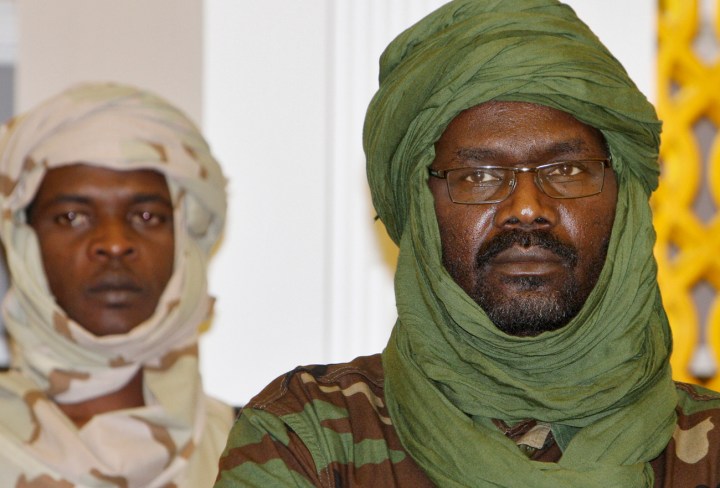Africa
Darfur rebel leader returns home from Libya, spoiling for a fight

The fallout from the war in Libya continues with the news that one of the most prominent rebel leaders in Darfur has returned to the troubled Sudanese region from Libya, apparently as part of a 10-vehicle convoy laden with Gaddafi gold and weapons. Khalil Ibrahim’s been out of action for a year, and his return could signal an escalation of hostilities in Darfur. By SIMON ALLISON.
Another mysterious convoy departs Libya. According to reports, 10 Landcruisers – the vehicle of choice for just about anybody up to no good in Africa – made the trek across the desert, going into Chad before making a sharp left and crossing the Sudanese border into the troubled region of Darfur. The vehicles were apparently stuffed with Gaddafi’s gold and weapons, and led by none other than Darfuri rebel leader Khalil Ibrahim.
Ibrahim would have enjoyed the trip. He’s been a guest of the Libyan government for more than a year now, a sojourn described by some as “finding refuge” and by others as “house arrest”. Abandoning flawed peace talks in May 2010, he flew to the Chadian capital N’Djamena, fully expecting to be welcomed with open arms by the government of Idriss Deby which has provided tacit support to the Darfur rebels for years. But allegiances shift quickly in this part of the world, and, unbeknownst to Ibrahim, the governments of Chad and Sudan were approaching some kind of rapprochement. Valuing his ties to Khartoum more than his affiliation with the Darfuri rebels, President Deby refused to even let Ibrahim off the plane. According to an outraged Justice and Equality Movement official, during a 19-hour diplomatic stand-off the authorities at N’Djamena airport destroyed Ibrahim’s passport and removed the ladder from the plane to prevent him getting out.
The plane was sent to Libya, where Gaddafi allowed the passportless Ibrahim to settle. Libya, unsurprisingly, was deeply involved in Sudan, rumoured to be providing arms and funding to Darfuri rebel groups. This was probably less to do with wanting to unseat the Sudanese government, and more to do with keeping in check Chadian rebel groups which used Darfur as a base. Controlling the Chadian rebels would keep Gaddafi’s Chadian President Deby in power, which was important to Gaddafi since he’d helped put Deby in power and wanted to maintain his influence on the uranium-rich country.
But unfortunately for Ibrahim, the relationship between Libya and Khartoum was also thawing. Not enough for Gaddafi to accede to requests to extradite Ibrahim to Khartoum, but enough for Gaddafi to prevent Ibrahim from returning to Darfur.
But now Gaddafi’s gone, and in the confusion Khalil Ibrahim has made his way back to Darfur. And he’s ready for action. “If Khalil Ibrahim has come back to the country it probably means he’s bringing money and arms and a bit of an injection into the activities of JEM in Darfur,” Sudan expert Petrus de Kock, senior researcher at the South African Institute of International Affairs, told iMaverick. “There is likely to be an increase in attacks on the Sudanese government.”
This interpretation of events was supported in a column written this week by the deputy chairman of Khalil Ibrahim’s group, the Justice and Equality Movement, “JEM is in a strong determined position and prepared to lead the initiative of regime change in the remaining Sudan to change the genocidal regime in Khartoum…many key regional and international players will be very supportive for such initiative, if we can succeed to create the momentum and impose the de facto situation on the ground. This initiative from JEM is based on the fact that the genocidal regime of the National Congress Party [Sudan’s ruling party] is an incorrigible depraved beast and morally corrupt entity and has to be deposed by collective force.”
The government of Sudan might struggle to deal with the a full-scale Darfuri rebellion, particularly given that its security forces are currently occupied with an attempt to wipe out opposition in the contested border state of South Kordofan. “It will put a lot of pressure on Khartoum,” said De Kock. “Chances are, the first answer will probably be some kind of military answer, unless someone like Mbeki [AU mediator in Sudan] and the AU can use the traction they have with Khartoum to prevent it.”
The Darfur rebellion began in 2003, with attacks on Sudanese government positions launched by JEM and the Sudan Liberation Army, which with its various factions is the other major rebel movement. This was in response to alleged discrimination against the area’s black Africans in favour of Arabs. Khartoum mobilised informal Arab militias to deal with the threat, and, ably supported by Sudanese security forces, the janjaweed forced 2.7 million people out of their homes and either directly or indirectly caused the deathsof 300,000 according to UN estimates. DM
Read more:
- Darfur rebel leader returns from Libyan refuge on Reuters Africa;
- The implications of the Libyan revolution on the Darfuris resident in Libya in the Sudan Tribune;
- Turmoil in Libya and the Darfur Conflict from Sudan Human Security Baseline Assessment.
Photo: REUTERS


















 Become an Insider
Become an Insider